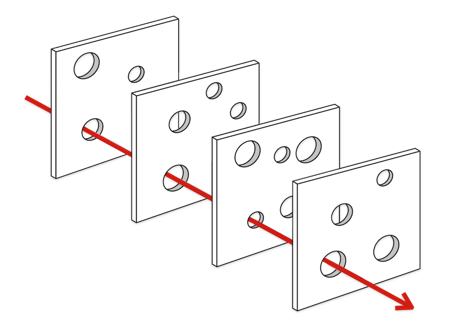Complex systems have complex failures
As the pandemic gets worse, I see a lot of people blaming China for everything. Across the political spectrum, China is being criticised for its slow response, being cagey about information, and allowing the food market where the virus was first transmitted to humans. I don’t have any specialist knowledge here, but I’m suspicious of any analysis that says China is solely to blame.
While true that the pandemic started in China, that’s not the only reason it’s been as bad as it has. Complex systems are, well, complex, and disasters occur when multiple things go wrong at once. It’s never a single country (or person) making one mistake.
Within risk analysis, there’s something called the Swiss cheese model of accident prevention, and I find it very useful. The idea is that systems should have many layers of protection: if one fails, there are other layers that can still prevent an accident. For something to go wrong, multiple layers of protection have to fail at the same time.
If you imagine some overlapping pieces of Swiss cheese, the holes have to line up before something can fall through:

When you want to understand an accident, it’s worth understanding all the layers involved. Don’t just look at the inciting event; look at all the other layers of protection that failed and allowed the event to occur. If somebody pushes a button that blows up your spaceship, don’t just ask, “Why did they press the button?”, but also ask, “Why was there a button that could blow up the spaceship?”
A good response from China is just one of the layers of Swiss cheese. If China had been wholly successful, they might have contained it entirely within their borders, and prevented its spread around the world, but they didn’t, and the virus spread. That’s a failure of a single layer – but there should have been other layers underneath.
Countries like the US and the UK should have had their own protections against a pandemic breaking out elsewhere. The scale of disaster in those countries is not solely the fault of China. Mistakes were made in lots of places, and we should be looking at those as much as China.
Here’s the thing: China is big. Really big. You just won’t believe how vastly, hugely, mind-bogglingly big it is. I mean, you may think it’s a long way down the road to the chemist, but that’s just peanuts to China. And because China is so big, there aren’t many levers the West can pull to force China to change its behaviour. You’ll get much further trying to implement policies at home to insulate you from China’s mistakes, than trying to force change in China.
And if you do somehow force a change in China’s behaviour, great, you’ve prevented the next pandemic that comes from China. But another pandemic could come from anywhere.
What if it’s camels in the Middle East? Bats in Guinea? Pigs in Mexico? Or a country that’s even stingier about information, like Putin’s Russia or Bolsonaro’s Brazil? Blame the foreigners all you like, but that won’t stop the next pandemic sweeping through your country.
Lots of organisations and governments had to make mistakes for this to be as bad as it is. Just blaming China is letting our own governments off the hook for their role in this crisis. We can ask questions about pandemic preparedness, availability of PPE, and testing – but only if we accept that our government needs to answer questions too, and this isn’t just China’s fault.
The idea that complex systems have complex failures is broadly applicable. When something goes wrong, it’s worth digging into the problem to understand all the layers – not just how the problem happened, but how circumstances arose that meant the problem was even possible. It takes more work, but over time, you end up building a much more robust and reliable system.
The transport industry is particularly good at this. Lots of transport accidents could be dismissed as the error of one individual, but agencies like the NTSB or RAIB pull back the layers to understand every factor that allowed a disaster – and then make recommendations to fix all of them. Their accident reports made for excellent reading.
When something bad happens, resist the urge to blame a single person (or in this case, country). Look for all the ways the system failed, and fix them together. It’ll leave you in a much better place for when the next problem inevitably occurs.
This post was originally a thread on Twitter.